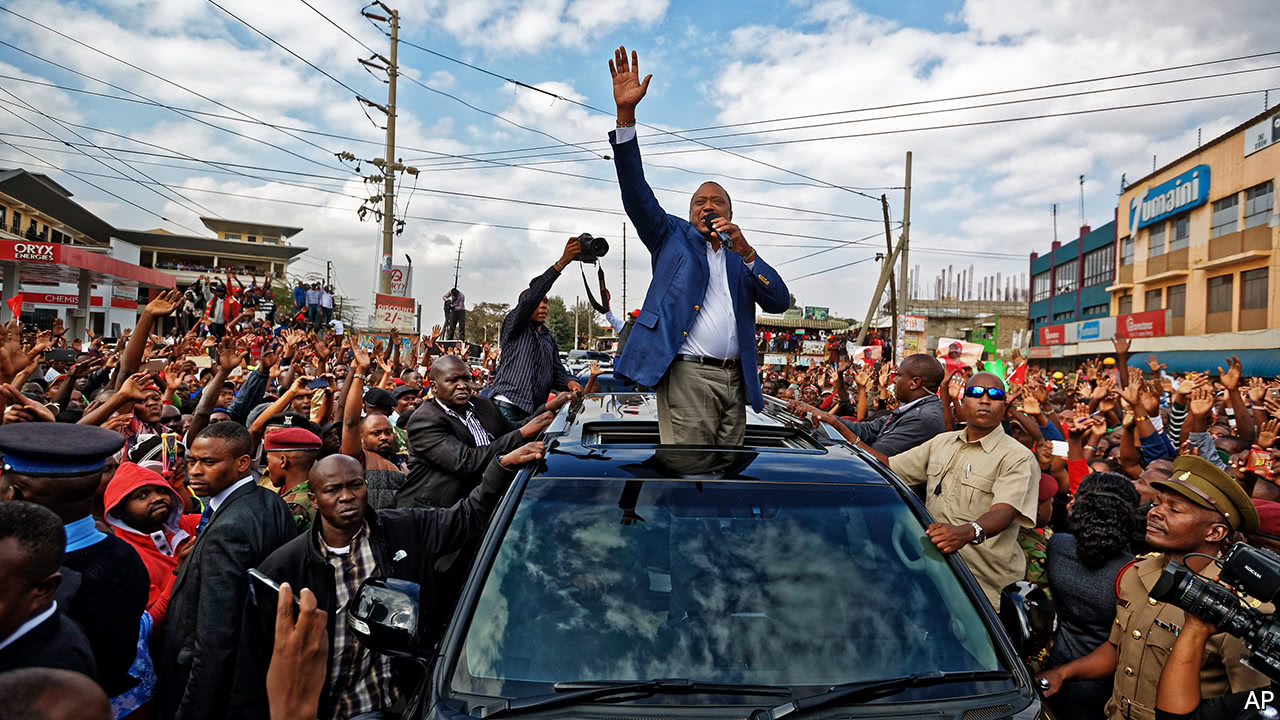The rematch: Kenya’s presidential election has been overturned. What next?
It was a triumph of the rule of law—but the country is now on edge

IF AT first you don’t succeed, try, try again. That, it seems, is the advice of Kenya’s supreme court to its electoral commission. In a shock decision on September 1st, the court ruled that the presidential election held last month, in which Uhuru Kenyatta, the incumbent, beat Raila Odinga (pictured), an opposition stalwart, was “invalid, null and void”. The vote, it said, had not been conducted in accordance with the constitution—so it must be redone.
As a display of judicial independence, the court’s decision is without precedent, not just in Kenya but across Africa, where it was widely acclaimed. It represents an opportunity—so optimists believe—to build genuine trust in the country’s institutions, especially its highest courts. Yet it also plunges east Africa’s biggest economy back into uncertainty and creates a new risk of violence. Arguments have already erupted over the timing of the new vote, which the electoral commission says it will hold on October 17th. Many Kenyans fear widespread violence is likelier this time around, especially if the result is closer.
The court has not yet published its full verdict. But in a preliminary statement it said it found “no evidence of misconduct” on Mr Kenyatta’s part. Nor did it endorse Mr Odinga’s theory that the electronic system used to record the results was hacked. Rather, the judges seem to have decided that they did not need proof of systematic rigging. That the electoral commission committed “irregularities and illegalities”, particularly in the transmission of results from polling stations to tallying centres, was enough to justify a new vote.
The decision surprised nearly everyone. Even before the election results were declared, James Orengo, a senator and close ally of Mr Odinga, announced that “going to court is not an alternative—we have been there before.” In the previous election, in 2013, when Mr Kenyatta beat Mr Odinga in a contest that most monitors considered flawed, the loser went in vain to court rather than risk a repeat of the violence that had followed the election in 2007, when around 1,400 people were killed. This time, when the National Super Alliance (NASA), Mr Odinga’s group of parties, filed its legal challenge it seemed like a concession to foreign diplomats, who feared more violence.
Courting controversy
Mr Odinga and his allies were jubilant at the decision. NASA declared that a “new Kenya has been born” and claimed vindication for their view that the election had been stolen. Mr Kenyatta called for the decision to be respected in a speech given in English. But in comments to supporters made in Swahili, he denounced the judges as wakora (crooks) and claimed that their decision was the work of “whites” and “homosexuals”. He vowed to “fix” the supreme court if re-elected.
Yet perhaps it should have been less of a surprise than it was. Kenya’s election was certainly far from perfect. A week before polling day, Chris Msando, the main technician in charge of the electronic voter-ID system, was found murdered, his body displaying signs of torture. That created suspicion that things might go awry.
Though polling day itself went smoothly, the transmission of results from polling stations was erratic. The results were supposed to have been recorded on 41,000-odd paper forms, one from each station. Yet the electoral commission failed to make many of the forms readily available to the public or to NASA. That could have been because of incompetence rather than foul play—a view shared by many of the Western monitors, who nonetheless stressed that their endorsement of the election was conditional on further analyses. Either way, the supreme court decided, by a verdict of four to two, that the flaws were serious enough to merit a re-run of the presidential contest. The other five sets of elections, including for members of parliament and for governors, were deemed fair.
Organising a better election will be fraught. The original vote cost some $500m and involved more than 300,000 temporary workers. Now the electoral commission has to repeat it, in a far shorter time, under heavier pressure. After it published its intended date for the new poll, in which only Mr Odinga and Mr Kenyatta would be running (and third-party candidates excluded), NASA accused it of becoming “rogue and unhinged”. The alliance has published a list of demands for the new vote, including suspending six senior officials and hiring a new contractor to print ballot papers. If they are not met, it says it will not take part.
Many Kenyans guess that, in the end, the result will be the same—and that Mr Odinga and his allies will still not accept it. Certainly, thanks to the supreme court’s decision, NASA will have gained momentum. But for all its flaws, it is still not obvious that the election was rigged by anywhere near the margin of nine percentage points that Mr Kenyatta had over Mr Odinga. (Mr Kenyatta’s party easily defeated Mr Odinga’s in the parliamentary election, albeit that the opposition split into separate parties competing against each other.) In a presidential re-run Mr Kenyatta, who is better funded and organised, is still likely to be the favourite, says Nicholas Cheeseman, a specialist in African elections at the University of Birmingham.
Protests after this year’s vote left at least two dozen people dead. But for the most part Kenya has avoided the violence that marred earlier polls. The court’s decision is intended to reinforce that progress by building trust in the country’s institutions and in the fairness of elections. Yet those high hopes could still be dashed to smithereens. The coming months will jangle Kenyan nerves.





